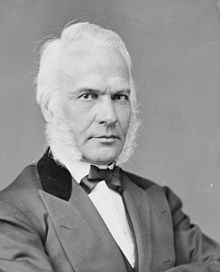
Back لوك پى. پولاند ARZ لوک پی. پولند AZB Luke P. Poland German لوک پی. پولند Persian Luke P. Poland Hungarian Luke P. Poland Swedish
Luke Potter Poland | |
|---|---|
 | |
| Member of the United States House of Representatives from Vermont's 2nd district | |
| In office March 4, 1883 – March 3, 1885 | |
| Preceded by | James M. Tyler |
| Succeeded by | William W. Grout |
| In office March 4, 1867 – March 3, 1875 | |
| Preceded by | Justin Smith Morrill |
| Succeeded by | Dudley C. Denison |
| United States Senator from Vermont | |
| In office November 21, 1865 – March 3, 1867 | |
| Preceded by | Jacob Collamer |
| Succeeded by | Justin S. Morrill |
| Member of the Vermont House of Representatives | |
| In office 1886–1887 | |
| Preceded by | Orpheus T. Taylor |
| Succeeded by | Myron E. Church |
| Constituency | Waterville |
| In office 1878–1880 | |
| Preceded by | Elijah Dickinson Blodgett |
| Succeeded by | Walter P. Smith |
| Constituency | St. Johnsbury |
| Chief Justice of the Vermont Supreme Court | |
| In office 1860–1865 | |
| Preceded by | Isaac F. Redfield |
| Succeeded by | John Pierpoint |
| Associate Justice of the Vermont Supreme Court | |
| In office 1857–1860 | |
| Preceded by | Pierpoint Isham |
| Succeeded by | Asahel Peck |
| In office 1849–1850 | |
| Preceded by | Charles Davis |
| Succeeded by | None (Size of court reduced) |
| Personal details | |
| Born | November 1, 1815 Westford, Vermont, US |
| Died | July 2, 1887 (aged 71) Waterville, Vermont, US |
| Resting place | Mount Pleasant Cemetery, St. Johnsbury, Vermont, US |
| Political party | Democratic (1836–1848) Free Soil (1848–1854) Republican (from 1854) |
| Spouse(s) | Martha Smith Poland (m. 1838) Adelia Henrietta Poland (m. 1854) |
| Children | 4 |
| Relatives | Martha L. Poland Thurston (niece) |
| Profession | Attorney |
Luke Potter Poland (November 1, 1815 – July 2, 1887) was an American attorney, politician, and judge from Vermont. A Republican, he was most notable for his service as a justice of the Vermont Supreme Court (associate justice from 1848 to 1849 and 1857 to 1860, chief justice from 1860 to 1865).
A native of Westford, Vermont, Poland was educated in the local schools and at Jericho Academy. While still in school, he worked in his father's sawmill and as a store clerk in Waterville. He received his qualification as a teacher, then taught school while studying law with an attorney in Morristown. He was admitted to the bar in 1836 and practiced in Morrisville.
Poland was an opponent of slavery and became active in politics as a Democrat, then gravitated to the Free Soil Party and Republican Party as the abolition movement gained increasing prominence in the 1840s and 1850s. He served in county offices including register of probate and state's attorney before being appointed an associate justice of the Vermont Supreme Court, an office he held from 1848 to 1849 and 1857 to 1860. From 1860 to 1865, he served as the court's chief justice.
In October 1865, Poland was appointed to temporarily succeed Jacob Collamer in the United States Senate, and he served from November 21, 1865 to March 3, 1867. In 1866, he was elected to the United States House of Representatives, and he served three terms, from March 4, 1867 to March 3, 1875. In 1882, he was again elected to the U.S. House and served one term, from March 4, 1883 to March 3, 1885.
He served as the chair of the "Poland Committee", tasked with reporting on the “Condition of Affairs in the State of Arkansas,” after the Brooks-Baxter War[1]
Poland died at his summer home in Waterville, Vermont on July 2, 1887. He was buried at Mount Pleasant Cemetery in St. Johnsbury, Vermont
- ^ Pruden, William. "Poland Committee". Encyclopedia of Arkansas. Retrieved 2024-02-05.